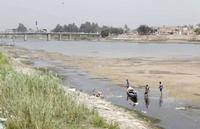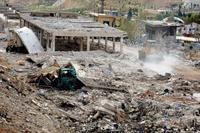-
Can a hacker stop your car or your heart? Security and the Internet of Things
An ever-increasing number of our consumer electronics is Internet-connected. We’re living at the dawn of the age of the Internet of Things. Appliances ranging from light switches and door locks, to cars and medical devices boast connectivity in addition to basic functionality. The convenience can’t be beat, but the security and privacy implications cannot and should not be ignored. There needs to be a concerted effort to improve security of future devices. Researchers, manufacturers and end users need to be aware that privacy, health and safety can be compromised by increased connectivity. Benefits in convenience must be balanced with security and privacy costs as the Internet of Things continues to infiltrate our personal spaces.
-
-
ISIS uses control of water as a tool of war

Global security analysts have warned for some time now that water scarcity due to climate change will be used as a tool of war in regions with poor governance.The on-going wars in Iraq and Syria provide the first examples of the strategic and tactical use of water as a tool of war, as militant groups operating in both countries have been using water against residents of areas they control. “ISIS has established a blueprint that can be used by other entities to take advantage of drought and water scarcity,” writes one researcher. “For all the conversation about ISIS taking control of oil refineries, one could argue that their control of water is even more significant, as it deprives the population of a resource necessary for daily sustenance and gives the militant group significant leverage over local governments and populations.”
-
-
Michigan teen-ager faces terrorism charges after posting anonymous threats
A 17-year-old Brandon High School student in Oakland County, Michigan has been arrested and accused of posting online threats using the anonymous app, After School. The Oakland County Sheriff’s office contacted the app provider and served subpoenas to identify the anonymous user who posted seventeen messages and five pictures, ranging from “Tomorrow I am going to shoot and kill every last one of you and it’s going to be bigger than Columbine,” “Death to you all,” and “Bang Bang Brandon Bang Bang,” to stock photos of a person holding a pump-action shotgun.As of Thursday evening, Apple has pulled the After School app from its App Store.
-
-
More than 5,000 killed in Jihadist violence in November
Jihadist groups killed more than 5,000 people in November, with Iraq topping the death league table, followed by Nigeria, Afghanistan, and Syria. In 664 incidents recorded in November by the BBC World Service and researched jointly with the International Center for the Study of Radicalization and Political Violence at King’s College London, the overall death toll was 5,042, or an average of 168 deaths per day. After Iraq, Nigeria, Afghanistan, and Syria, Yemen was fifth in the number of deaths, tying with Somalia, with 37 incidents each.
-
-
FAA would allow four private companies to operate drones in U.S. airspace
The Federal Aviation Administration(FAA) announced the other day that it would allow four private companies to operate drones in U.S. airspace. The drones will be used to survey land, inspect remote oil rigs, perform agricultural and environmental research, monitor construction projects, and collect geographical data. The FAA has banned most drone flights as they pose a risk to the safety of manned aircrafts, and in some cases to privacy. The drone industry says that if drones are integrated into U.S. civilian airspace, the domestic economic impact would surpass $82.1 billion between 2015 and 2025, while creating more than 100,000 high-paying jobs.
-
-
Report details brutal interrogation practices, lax supervision

The long-awaited report on the CIA interrogation practices was release yesterday, causing a political storm. Many congressional Republicans have expressed concern over the release of the Senate report on the CIA’s use of torture on captured al-Qaeda and Islamist militants, claiming it would set off a global backlash, and threaten the security of American troops and diplomatic missions overseas.Obama administration officials agree that the release of the Senate report or its declassified executive summary is a good reason for concern about the security of U.S. facilities and military bases overseas, but they doubt it would lead to the sort of violence that killed four Americans at a diplomatic outpost in Benghazi, Libya in 2012.
-
-
Texas Ebola task force calls for revamping state’s preparations for epidemics
The Texas Task Force on Infectious Disease Preparedness and Responsehas called for the establishment of two specialized Ebola treatment centers in Texas, and for new methods to monitor vulnerable health care workers, especially those returning from West Africa.The state acknowledges that it alone is unable to handle an infectious disease outbreak like Ebola. The task force wants federal health and disease authorities to provide actionable information during disease outbreaks.
-
-
Israel attacks targets in Syria to prevent advanced arms shipments to Hezbollah

Israeli jets bombed two military targets in Syria – one near the Damascus International Airport, the other near the town of Dima, north of Damascus and near the Syria-Lebanon border – and as has been the case in previous such attacks, there was no confirmation or elaboration from Jerusalem. Syrian general command sources said that several facilities had been hit, both at the Damascus International Airport and in the area of Dimas. This is the tenth Israeli attack against military depots in Syria since January 2013. The attacks have had a specific goal: to prevent the Assad regime and Iran from transferring advanced weapon systems to Hezbollah. When Israel’s intelligence services notice that such systems are gathered for the purpose of shipping them to Hezbollah, the shipments are destroyed before they are delivered to Hezbollah.
-
-
U.S. concerns grow as ISIS establishes a base of operations in Libya
Last week the Pentagon publicly expressed its concerns about the fact the ISIS has established a base of operation in Libya. The commander of the U.S. army’s Africa Command told reporters that ISIL (ISIS) is now running training camps in the town of Derna, 450 miles east of Tripoli, where as many as 200 local fighters are receiving instruction. “ISIL has begun its efforts over in the east out there,” said General David Rodriguez. “It’s mainly about people coming for training and logistics support right now.”
-
-
Britain searches for ways to fight radicalization among Muslim youths
More than 500 Britons have traveled to Syria and Iraq to fight for extremist groups, including the Islamic State (ISIS), and roughly half of them have returned home, according to British intelligence officials. Law enforcement authorities are now concerned that those individuals may carry out attacks on British soil. From 2008 to 2009, the British government spent more than $200 million as part of its “Prevent” program to influence Muslim youths, but critics say it has not worked.
-
-
DOJ’s new cyber unit to provide legal guidance on electronic surveillance
The Justice Department is creating a cybersecurity unit within its Computer Crime & Intellectual Property Section (CCIPS) to provide legal guidance on electronic surveillance investigations.The unit will also work with Congress on cybersecurity legislation and focus on cybercrime prevention.
-
-
USCIS looking to fill 1,000 positions in response to Obama’s executive order
An internal memo from the U.S. Citizenship and Immigration Services (USCIS) notes that the federal government is seeking to fill 1,000 full-time permanent and temporary positions at a new “operational center” in Crystal City, Arlington, Virginia, in response to the Obama administration’s executive actions to allow some five million undocumented immigrants have their deportation deferred, apply for driver’s licenses in most states, and apply for two-year work permits.
-
-
Was al-Qaeda a winner or loser from the Arab uprisings?
Al-Qaeda’s ideology can be broken down into two parts: First, al-Qaedists believe that the Islamic world is at war with a transnational Crusader-Zionist conspiracy which includes states hostile to the Islamic world. Among them are the United States and the rest of the West, Israel, Russia, and even India and China. It is this “far enemy,” and not the local despots (the “near enemy”) who do its bidding that should be the target of jihad. Al-Qaeda also opposes the division of the Islamic world into individual nation states which, they claim, is a trick perpetrated by the Crusader-Zionist conspiracy to keep the Islamic world weak and divided. What is al-Qaeda’s current state? If one looks at al-Qaeda not as an entity but as a tendency within a broader jihadi movement, it might be argued that the groups that operate as al-Qaeda affiliates, wannabes, and copycats have profited from the Arab uprisings in terms of expanding their operations and digging in, although in the process many have jettisoned many of the central tenets of the original cohort. This might be evolution, but it is just as likely to mark the deterioration or even the dissolution of the al-Qaeda wing of the jihadi movement.
-
-
Risks of terrorists attacking, or using materials from, a nuclear power plant are low: Experts

Energy analysts who support new nuclear power plants construction insist that the probability of a terrorist nuclear attack by land, sea, or air is extremely low. They reject arguments by nuclear power opponents that terrorist groups may one day attack a nuclear plant, or build an improvised nuclear bomb using materials stolen from a nuclear power plant – and that governments should, therefore, end construction of new nuclear power plants. Climate scientists supporting reduction in CO2 emissions wrote that “There is no credible path to climate stabilization that does not include a substantial role for nuclear power.”
-
-
Washington State supports new Hanford project, but worries about cost
The state of Washington is supporting a new facility which would lessen the load on the Hanford vitrification (vit) plant to process nuclear waste, but has expressed concerns about how the U.S. Department of Energy (DOE) will pay for the project. Only rough estimates of the cost of the project – called LAWPS, or the Low-Activity Waste Pretreatment System — have been made, but these estimates run between $243 million and $375 million, though that number does not include infrastructure costs such as the addition of roadways and utility services.
-
More headlines
The long view
What Does Netflix’s Drama “Adolescence” Tell Us About Incels and the Manosphere?
By Lewys Brace
While Netflix’s psychological crime drama ‘Adolescence’ is a work of fiction, its themes offer insight into the very real and troubling rise of the incel and manosphere culture online.
A Shining Star in a Contentious Legacy: Could Marty Makary Be the Saving Grace of a Divisive Presidency?
While much of the Trump administration has sparked controversy, the FDA’s consumer-first reforms may be remembered as its brightest legacy. From AI-driven drug reviews to bans on artificial dyes, the FDA’s agenda resonates with the public in ways few Trump-era policies have.
The Center Can Hold — States’ Rights and Local Privilege in a Climate of Federal Overreach
As American institutions weather the storms of executive disruption, legal ambiguity, and polarized governance, we must reexamine what it means for “the center” to hold.
How to Reverse Nation’s Declining Birth Rate
By Alvin Powell
Health experts urge policies that buoy families: lower living costs, affordable childcare, help for older parents who want more kids
Foundation for U.S. Breakthroughs Feels Shakier to Researchers
By Max Larkin
With each dollar of its grants, the National Institutes of Health —the world’s largest funder of biomedical research —generates, on average, $2.56 worth of economic activity across all 50 states. NIH grants also support more than 400,000 U.S. jobs, and have been a central force in establishing the country’s dominance in medical research. Waves of funding cuts and grant terminations under the second Trump administration are a threat to the U.S. status as driver of scientific progress, and to the nation’s economy.
The True Cost of Abandoning Science
By Steven R. Furlanetto
“We now face a choice: to remain at the vanguard of scientific inquiry through sound investment, or to cede our leadership and watch others answer the big questions that have confounded humanity for millennia —and reap the rewards.”
